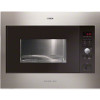AEG MCD2664E-M Product Manual - Page 10
Child safety lock, Microwave cooking
 |
View all AEG MCD2664E-M manuals
Add to My Manuals
Save this manual to your list of manuals |
Page 10 highlights
10 Microwave cooking advice Child safety lock The oven has a safety feature which prevents the accidental running of the oven by a child. When the lock has been set, no part of the microwave will operate until the lock feature has been cancelled. Example: To set the child safety lock. 1. Press and hold the stop button for 5 seconds. The oven will beep twice and 'LOC' will be displayed: Note: • To cancel the child safety lock, press and hold the stop button for 5 seconds, the oven will beep twice and the time of day will be displayed. • Child safety lock cannot be set if the clock is not set. MICROWAVE COOKING ADVICE Microwave cooking To cook/defrost food in a microwave oven, the microwave energy must be able to pass through the container to penetrate the food. Therefore it is important to choose suitable cookware. Round/oval dishes are preferable to square/oblong ones as the food in the corners tends to overcook. It is important to turn, rearrange or stir food to ensure even heating. Standing time is necessary after cooking as it enables the heat to disperse equally throughout the food. Food characteristics Composition Foods high in fat or sugar (e.g. Christmas pudding, mince pies) require less heating time. Care should be taken as overheating can lead to fire. Density Food density will affect the amount of cooking time needed. Light porous foods, such as cakes or bread, cook more quickly than heavy, dense foods, such as roasts and casseroles. Quantity The cooking time must be increased as the amount of food placed in the oven increases. E.g. four potatoes will take longer to cook than two. Size Small foods and small pieces cook faster than large ones, as microwaves can penetrate from all sides to the centre. For even cooking make all the pieces the same size. Shape Foods which are irregular in shape, such as chicken breasts or drumsticks, take longer to cook in the thicker parts. Round shapes cook more evenly than square shapes when microwave cooking. Temperature The initial temperature of food affects the amount of cooking time needed. Chilled foods will of food take longer to cook than food at room temperature. Cut into foods with fillings, e.g. jam doughnuts, to release heat or steam.















